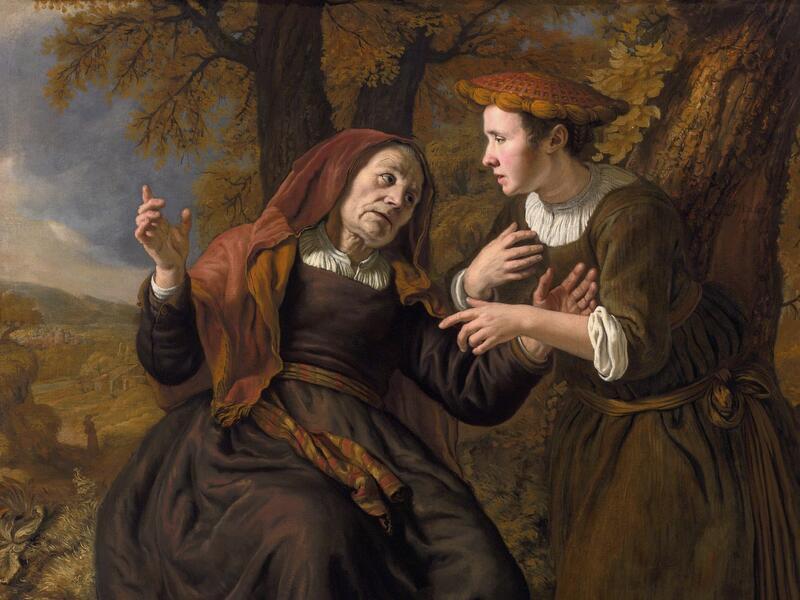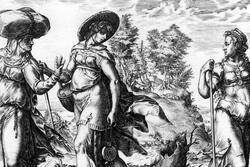"Wherever You Go, I Go": Queerness in the Book of Ruth
Woman-centric Bible stories are hard to come by, let alone feminist or queer ones. The Book of Ruth, which we read every Shavuot, stands as a clear exception to the patriarchal rule. The story begins with Naomi, a Jewish woman married to Elimelech from Bethlehem. They have two sons who marry non-Jewish, Moabite women named Orpah and Ruth. When Elimelech and his two sons die, Naomi commands widowed Orpah and Ruth to return to Moab for a fresh start. Orpah obeys, but Ruth refuses: “Do not urge me to leave you, to turn back and not follow you. For wherever you go, I will go; wherever you lodge, I will lodge; your people shall be my people, and your God my God.”
These are the story’s most famous words and act as the entrypoint for interpreting the biblical tale through a queer lens. Dr. Ruth Preser, a feminist activist and lecturer at Tel-Hai College and University of Haifa, writes in her 2017 essay “Things I Learned from the Book of Ruth: Diasporic Readings of Queer Conversations” that “the organizers of the Third Lesbian Conference held in Natanya, Israel in 2004 chose the opening of Ruth’s pledge to Naomi ‘Wherever you go, I go’ as the inscription on the conference tshirts. The Scroll [the Book of Ruth] is moreover used by both proponents and opponents of same-sex marriage in the debate raging in the United States” (insertion mine).
If mapping queerness onto the story doesn’t convince you, look at the existing elements, which heighten queer ties and themes. For example, Ruth and Naomi have the rare opportunity to make their own decisions, not tethered to any husband or master. They’ve also lost the status of “mother/daughter-in-law,” as both Naomi’s and Ruth’s husbands have died. These two women are not legally beholden to each other, and yet they choose to remain together. Ruth’s proclamation makes it seem as though this choice to stay together is out of need—albeit emotional, not lawful—rather than want.
The companionship these two biblical women display is in itself is remarkable. Queerness is not always just about one’s sexual or romantic inclinations, but also one’s status in relation to a group, or one’s unorthodox tendencies, exemplified by one’s behaviors or the company one keeps. This story is queer without Ruth and Naomi having to express sexual or romantic attraction to each other, as Preser explains: “The Book of Ruth does not detail the relationship between Ruth and Naomi; it simply presents us with an exceptional story of devotion…Cautious not to apply an anachronistic conception of lesbianism to the text, queer scholars seem to agree that the Ruth–Naomi dyad offers a powerful biblical example of same-sex intimacy.” The very existence of Ruth and Naomi’s intimate relationship in the Bible, a thousands-of-years-old text, is significant and radical.
Ruth and Naomi’s story does eventually intersect with that of a man when they journey to Bethlehem and find they’re on a plot of land owned by Boaz, a kinsman of Elimelech. They’ve arrived at the beginning of the barley harvest, which is why we’re led to believe that this story occurs around the time that Shavuot is celebrated. Ruth’s first impulse is to go harvest barley. Boaz notices her, and after learning of her story and hard work from a servant, tells her to stay in his field where she can reap unbothered.
Ruth asks, “Why are you so kind as to single me out, when I am a foreigner?” (Her foreigner status, both as someone from another land and as a non-Jew, enhances her queerness in the story’s context in that queerness is inextricably tied to “otherness”; Ruth is the Other threefold.) Boaz replies, “I have been told of all that you did for your mother-in-law after the death of your husband, how you left your father and mother and the land of your birth and came to a people you had not known before.” Boaz grants her kindness precisely because of her devotion to Naomi. One can argue that Boaz simply values family loyalty, but after the deaths of the men in their lives, Ruth and Naomi no longer have any familial obligation to each other. Despite this, Boaz supports Ruth and Naomi’s relationship by offering his approval of Ruth.
Naomi, wishing to find Ruth a new home, instructs Ruth to seduce Boaz, as Preser describes. The two do eventually marry and have a child (whose grandson will be King David), but Naomi becomes the baby’s mother: “Naomi took the child and held it to her bosom. She became its foster mother…” To Preser, this addition to the family does not negate Ruth and Naomi's relationship. She writes that this birth marks the creation of a new, unconventional family: Boaz is the biological father, Ruth is the biological mother, and Naomi is the child's foster parent and Ruth's lover.
This Shavuot, it’s important to incorporate a queer reading of the Book of Ruth because examples of relationships like Naomi and Ruth’s are so rare. It’s a powerfully feminist story that involves both a decision absent of men, and then kindness from a man because of the love between two women. While the argument for this story’s queerness isn’t necessarily literal, and doesn’t necessarily posit that Ruth and Naomi are lesbians, it is well supported by the text. It’s essential to call attention to feminist themes in biblical stories where we see them, as women in sacred texts are few and far between, and queerness is integral to that inclusive feminism. This story is such a clarion call for women loving women, that when some assert that queer interpretations of this text are simply “reading into things,” I wonder, “How could you not?”








I could see this story going with either interpretation, as I can detect the familial bond and loyalty, but I can also sense some hints of potential romantic tension. Additionally, we don't know everything that has occurred in the past, and to paraphrase someone's comment from a post on reddit, we can't know every event that occurred in a person from the ancient past's life, nor can we judge their sexuality or something from the knowledge we do have. From the context, I doubt this was the case, but we can never truly know. As another commenter on the same post said(or something along those lines), for all we know, every 20th century famous person could have been queer. I mean, that's my interpretation as someone wholly unassociated with any religion that has this tale in their holy book and simply read it in a literature class in high school.
Also, additional thing that's pretty much unrelated, but when I imagined Ruth clinging to Naomi's legs, it looked so cute! Maybe that cuteness is causing me to be biased, who really knows.
Female-female homoeroticism: Ruth and Naomi. The homoerotic hypothesis says: there is an erotic bond between Ruth and Naomi. That is: there is companionate love between them, and it is (to some degree) sexually mediated. The heteronormative hypothesis denies this. It says “they’re just friends”.
When Ruth expresses her commitment to Naomi, she is described by the narrator as “clinging” to Naomi: “Ruth clung to her”. The Hebrew verb that is translated as “clinging” is also translated as “cleaving”. When a relation between two people is described that way, it is unique in the scriptural tradition. It communicates something specific in the tradition.
It starts off from the very beginning: it describes the relation between Adam and Eve: “ Therefore a man leaves his father and mother and cleaves to his wife, and they become one flesh”. “ Becoming one flesh” is a euphemism for a sexual union. So, then describing the relation between Ruth and Naomi as “clinging” is suggestive of an erotic bond.
This is reinforced by Boaz’s description of their relation: “ all that you have done for your mother-in-law, since the death of your husband has been finally told me, and how you LEFT YOUR FATHER AND MOTHER and your native land, and came to a people that you did not know before”. This description invites a comparison between the relation between Ruth and Naomi (Ruth leaves her mother and father for Naomi), and the relation characteristic of Adam and Eve (the man leaves his father and mother for his wife). Since the relation between Adam and Eve is one involving an erotic bond, this suggests an erotic bond between Ruth and Naomi.
Moreover: Ruth is suggested as performing the role that a man traditionally preforms (he leaves mother and father for his wife). This is a gender-bending performance. Ruth also sexually seduces Boaz, a role traditionally performed by the man (the word “feet” is a euphemism for cock—and it occurs repeatedly in the description of Ruth’s seduction of Boaz). It’s another gender-bending performance. Ruth performs the work of harvesting in the field (a role traditionally performed by men); the men draw the water (a role traditionally performed by women). These are gender-bending performances.
Ruth gives birth to a son. He is the son of Ruth. But who else is he a son of? Intuitively, it’s Boaz. But the narrator never describes him as the son of Boaz. The narrator says “the LORD gave her conception, and she bore A son”, not “she bore HIM a son”. And none of the characters describe the child as the son of Boaz. The women of the neighborhood describe him as “the son of Naomi”: “a son has been born to Naomi”. This suggests that Naomi is performing the role of father. That’s what’s rendered salient in the text. It’s a gender-bending performance. Naomi also performs the role of mother, when she becomes the child’s nurse. It’s a gender-fluidity performance.
Gender-bending and gender-fluidity performances are associated with homoeroticism. It invokes the impression that the relation between Ruth and Naomi is one involving an erotic bond.
The straights are really straighting in these comments
In reply to The straights are really… by Bgolgay
They really do protest too much! lol.
Whenever I SEE someone type like THIS in a DONALD Trump TWEET style, I feel LIKE whatever they have just written is PROBABLY garbage and I skip IT TO save myself some TIME
My God, what nonsense!
I came across this article when I was searching on Google if there is a romance book based on the story of Ruth (like the book Redeeming Love by Francine Rivers is based on the story of the prophet Hosea), and I was curious to see where they managed to see elements "queer" in a book... FROM THE BIBLE! First of all, I have to admit that the article is so, SO absurd, that it's impossible not to have a good laugh with it (but the laughter and the beautiful painting by Jan Victors are the only good thing, obviously).
1st "Ruth and Naomi have the rare opportunity to make their own decisions, not tethered to any husband or master". Contrary to what the crazy feminist mind of the 21st century thinks, it was simply HORRIBLE for a woman not to have a husband: the law of inheritance instituted by God predicted that the first heirs are male children; if there are no sons, then the daughters will inherit; if there are also no daughters (which is the case of Elimelek, Mahlon and Kilion), the inheritance will go to the closest male relative of the deceased (see Numbers, 27). In other words, Ruth and Noemi had no house, no goods, they had NOTHING, as the right of inheritance belonged to Elimelek's male relatives. Certainly, Ruth would rather be a woman "tethered" to a kind and rich man like Boaz than a woman alone, poor and working in the barley fields.
2nd "Ruth’s proclamation makes it seem as though this choice to stay together is out of need—albeit emotional, not lawful—rather than want”. No, Ruth did not stay with Naomi out of “emotional necessity”, much less out of “want”. Ruth chose to stay with Naomi out of LOYALTY, unlike Orpah, who turned her back on her mother-in-law (turning her back is exactly why she is called Orpah, it is the meaning of this name). Ruth had a heart, she would not happily return home to live with her parents and leave her elderly mother-in-law alone, without relatives, land or money. She felt indebted to the woman who raised her husband, who accepted her as a daughter-in-law, and who needed her when Mahlon died.
3rd "One can argue that Boaz simply values family loyalty, but after the deaths of the men in their lives, Ruth and Naomi no longer have any familial obligation to each other". Ruth and Naomi no longer have any familial obligation to each other"??? REALLY?????? Again: Ruth was welcomed by Naomi into her family, lived for years with Naomi's son and was always treated well by her mother-in-law. So when her mother-in-law needs her, should Ruth turn her back like Orpah did because she "no longer has any family obligations"? Only a very selfish and heartless person would be capable of saying such nonsense. Ruth (as a good daughter of God and also as the woman Maalon loved) had a DUTY to care for the elderly and powerless Naomi.
4th "Naomi, wishing to find Ruth a new home, instructs Ruth to seduce Boaz, as Preser describes. The two do eventually marry and have a child (whose grandson will be King David), but Naomi becomes the baby’s mother: “Naomi took the child and held it to her bosom. She became its foster mother…” To Preser, this addition to the family does not negate Ruth and Naomi's relationship. She writes that this birth marks the creation of a new, unconventional family: Boaz is the biological father, Ruth is the biological mother, and Naomi is the child's foster parent and Ruth's lover". This paragraph here has SO MUCH nonsense: Ruth doesn't seduce Boaz, Ruth lies down at his feet (which meant, servitude, submission) and asks him to exercise the right of redemption (see Leviticus, 25) and also the Law of Levirate (see Genesis, 38 and Deuteronomy, 25), and it is precisely through the exercise of the Law of Levirate that the father of Boaz's son was Mahlon, the Naomi's son, and therefore she was the baby's grandmother. Boaz was the biological father, Ruth was the biological mother, Naomi was legally THE GRANDMOTHER and Maalon was legally THE FATHER, including for inheritance purposes.
5th "It's a powerfully feminist story". REALLY??? Feminism preaches that women don't need men for anything and can fend for themselves, but when Ruth and Noemi were alone, they were screwed: they were poor, without land, without goods, without a home, and they needed a man to exercise their right to the inheritance of dead husbands. They only became financially secure when Boaz married Ruth. Furthermore, when at the beginning of the book Naomi tells Ruth that she is old and will not marry again, but her daughter-in-law is young and can marry again, she is expressing the desire that Ruth find a loving and kind man: Naomi would not wanting less for Ruth than someone like Mahlon. Naomi wanted a man for Ruth, this is clear from the beginning of the book, and it becomes even clearer when Naomi suggests that Ruth marry the rich Boaz to free them from poverty and insecurity. They wanted and needed a man.
I think those who see this as queer do so because they are looking at the other aspects in a "relationship" other than the sex. Those who don't see it as queer is because correct Naomi and ruth have no sexual activity. Those who are same gender attracted know it's more than sex when it appears that's all the bible condemns. Furthermore, those committing the sexual acts could have been "heterosexual" and using sex for other means other than a result of love.
I used your article on my wedding website, because "Our Story" tab on the site I used to talk about my favorite book in the bible, Ruth. I have cited and included your link for further reference. Thank you so much for writing this article. If you would like to see when I publish the site, I will share the link with you!
You see what you want to see and hear what you want to hear.
Ruth and Naomi were not “queer” and were not intimate. They were mother-in-law and daughter-in-law whose devotion to each other is heart-warming but it was in no sexual
Nowhere in the entirety of the Bible is a same-sex relationship explicitly praised. Indeed, they are always condemned. The only ones noted as praiseworthy are those between a man and woman in holy matrimony.
Those who desire to find same-sex behavior in the Bible are forced to use “could mean”, “might be” or any other assumption. The total lack of other supporting scriptures to back up the argument about Naomi and Ruth is a big red flag.
They try to twist scriptures to conform to or support their way of life instead of conforming their way of life
to the Bible. Don’t buy into this twisted explanation. Do your own research.
In reply to You see what you want to see… by Ron
could you be more specific about who "they" are and what you think we should do about "them" please? :) you would never claim to understand G-d's all knowing judgment of other people, would you? :)
I found the description of queer/otherness to Ruth and Naomi’s relationship interesting. I also agree with the category of “otherness” used to describe it. However, I felt the article could’ve included more quotes and bible references to back its claim. Even though I avidly agree that David and Johnathan had a romantic relationship because of the text no matter what interpretation, I don’t see how there is enough text to adequately describe this relationship as romantic. The vows are powerful and very much equal marriage. But then this would insinuate that Naomi may have been in love with her sons wife. Then you could speculate that she loved her while she was married to her son which would bring up a greater or more complex relationship. But I’d like more historical evidence to support the idea of queer.
Otherness is an adequate description, but I would also like to research its category more as well.
She was her Mother in law, not her lover. Please don't push your wants on someone else.
Thank you for writing this, it's a lovely story and Ruth's vow to Naomi is so romantic and powerful.
Whoever wrote this is a complete and utter fool! The book of Ruth is literally God showing us to trust his wisdom! Ruth stays with her mother in-law out of loyalty and in return her mother in-law sets her up with Boaz. Both eventually become great great grandparents of David who later makes the path clear for our Lord and savior Jesus Christ. Repent, and stop your wicked foolish ways it literally makes no sense how far y’all are reaching.
Are you serious? Simple loyalty and friendship do not express queerness. This is quite a bogus self-insert if I have ever seen one.
Ruth and Naomi are (obviously) bisexual!
There's a story of Jonathan, a gay man elsewhere in the old testament.
Today's zealots, especially in America, are so off base in their hatred...
Desiring to stay with a mother-in-law does not indicate queerness! Remember, Jewish girls were married off young (12-13) to older men & boys, having their first child at 13-14. Old Naomi, after losing grown sons and husband needed help and Ruth stayed as a filial "daughter" and because leaving her "mother" caused distress; not unusual! More learned, Naomi naturally advised Ruth and took care of children and home. Honestly, assuming queerness fits Dr. Presser's unsupported narrative, not the Biblical reality of young Jewish girls like Ruth.
In reply to Desiring to stay with a… by Cat
Hi! Ruth was actually a Moabitess, not a Jewish girl. I think the "otherness" involved in her being a migrant is important for understanding her as a character!
How could you not! This is some deep love. People use versions of what Ruth says to Naomi in romantic contexts all the time. Never knew before tonight that it was originally between two women. That’s beautiful.
I love this interpretation of the text. I feel like the love Ruth has for Naomi is somehow more authentic than other love I have seen in the bible.
Really? An article with no basis and no point.